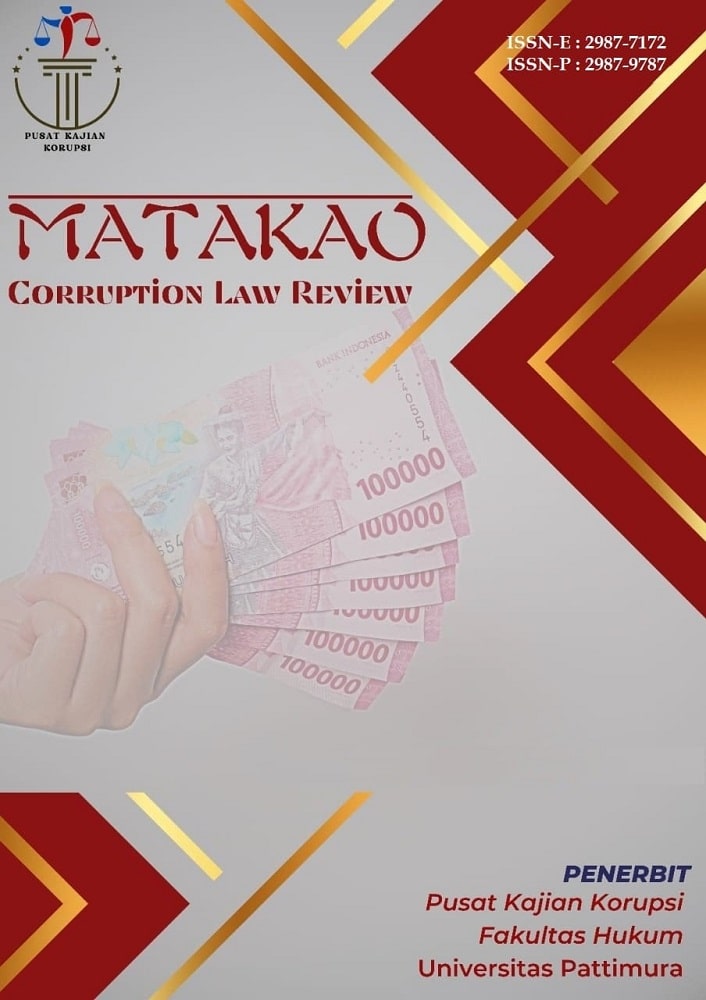Aspek Penologis Alasan Peringanan Pidana Bagi Pelaku Tindak Pidana Korupsi
Abstract
Introduction: Corruption gets more attention than other crimes because of its huge negative impact. In deciding corruption cases, judges always consider various aspects because they have legal and ethical responsibilities. There is no standard reference regarding the reasons for mitigating or increasing sentences, making it difficult to determine the reasons for light or heavy sentences. Therefore, an in-depth study is needed. Several cases show that penological aspects, such as rehabilitation and reintegration of perpetrators, can be a reason to reduce sentences.
Purposes of the Research: This study aims to examine the requirements and role of penological aspects in reducing sentences for corruption perpetrators.
Methods of the Research: The legal research used is a normative legal research type which is descriptive and analytical in nature.
Results of the Research: The results of the study show that the reasons for reducing sentences for corruption perpetrators include the defendant's awareness and regret, frank confession, never having been convicted, restitution of state losses, family responsibilities, and services to the state or society. However, the use of the penological aspect in the Central Jakarta District Court Decision Number: 29/Pid.Sus-TPK/2021/PN Jkt.Pst is considered odd, especially the reason that the defendant has suffered enough from public insults. This phrase is considered to hurt the sense of justice and should not be used, especially in cases of social assistance corruption when the country is experiencing a non-natural disaster.
Downloads
References
Andi Hamzah, Asas-Asas Hukum Pidana, Jakarta: Rineka Cipta, 1994.
Andi Sofyan, Hukum Acara Pidana Suatu Pengantar, Yogyakarta: Rangkang Education, 2013.
Barda Nawawi Arief, Kapita Selekta Hukum Pidana, Bandung: Citra Aditya Bakti, 2003.
Denny Latumaerissa, “Tinjauan Yuridis Tentang Penerapan Ancaman Pidana Mati dalam Tindak Pidana Korupsi”, Jurnal Sasi 20 no. 1 (2014).
Jetty Martje Patty. “Pelarangan Mantan Terpidana Korpusi Menjadi Calon Kepala Daerah Agar Menimbulkan Efek Jera”. Jurnal Belo 5 no. 1 (2019).
Julianus Edwin Latupeirissa, Penegakan Hukum Tindak Pidana Korupsi Yang Dilakukan Oleh Komisi Pemberantasan Korupsi. Disertasi: Fakultas Hukum Universitas Hasanuddin. Makassar, 2019.
M. Yahya Harahap, Pembahasan Permasalahan dan Penerapan KUHAP, Pemeriksaan Sidang Pengadilan, Banding, Kasasi, dan Peninjauan Kembali, Jakarta: Sinar Grafika, 2005.
Matheus Nathanael.dkk. Buku Saku Peraturan Mahkamah Agung Nomor 1 Tahun 2020, Mahkamah Agung, Fakultas Hukum Universitas Indonesia. 2020.
Moelyatno, Membangun Hukum Pidana, Jakarta: Bina Aksara, 1985.
Peter Mahmud Marzuki, Penelitian Hukum, Jakarta: Kencana, 2007.
Roeslan Saleh, Stelsel Pidana Indonesia, Jakarta: Aksara Baru, 1978.
Romli Atmasasmita, Sistem Peradilan Pidana: Perspektif eksistensialisme dan abolisionalisme, Bandung: Putra Abardin, 1996.
Sudarto, Kapita Selekta Hukum Pidana, Bandung: Alumni, 1981.
Sudarto, Hukum dan Hukum Pidana, Bandung: Alumni, 1981.
Sudarto, Hukum Pidana I, Semarang: Fakultas Hukum Undip, 1988.
Sutiyoso Bambang, Metode Penemuan Hukum, Yogyakarta: UII Press, 2007.
Tolib Effendi, Sistem Peradilan Pidana: Perbandingan Komponen Dan Proses Sistem Peradilan Pidana Di Beberapa Negara, Yogyakarta: Pustaka Yustisia, 2013.
Tolib Setiyadi, Pokok-pokok Hukum Penitensier Indonesia, Bandung: Alfabeta, 2010.
Copyright (c) 2025 Syaiful Achmad Zidane Marasabessy, Julianus Edwin Latupeirissa, Jetty Martje Patty (Author)

This work is licensed under a Creative Commons Attribution-NonCommercial 4.0 International License.
Copyright:
Authors who publish their manuscripts in this Journal agree to the following conditions:
- The copyright in each article belongs to the author, as well as the right to patent.
- Authors are able to enter into separate, additional contractual arrangements for the non-exclusive distribution of the journal's published version of the work (e.g., post it to an institutional repository or publish it in a book), with an acknowledgment of its initial publication in this journal.
- Authors are permitted and encouraged to post their work online (e.g., in institutional repositories or on their website) prior to and during the submission process, as it can lead to productive exchanges, as well as earlier and greater citation of published work.
- Authors have the right to self-archiving of the article (Author Self-Archiving Policy)
Licence : This Journal is disseminated based on the Creative Commons Attribution-NonCommercial 4.0 International license terms. This license allows anyone to copy and redistribute this material in any form or format, compose, modify, and make derivatives of this material for any purpose. You cannot use this material for commercial purposes. You must specify an appropriate name, include a link to the license, and certify that any changes have been made. You can do this in a way that is appropriate, but does not imply that the licensor supports you or your use.

This work is licensed under a Creative Commons Attribution-NonCommercial 4.0 International License..












